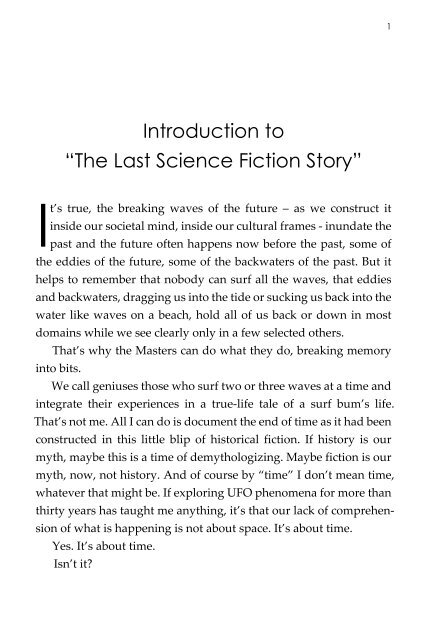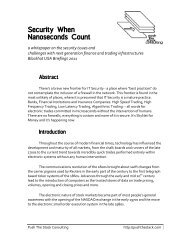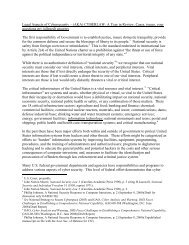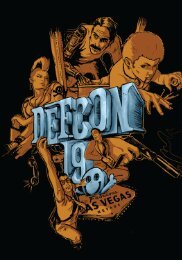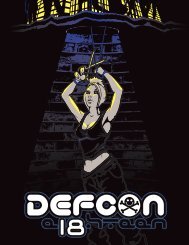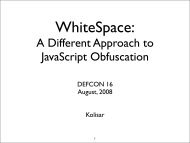16 The Last Science Fiction Story
16 The Last Science Fiction Story
16 The Last Science Fiction Story
- No tags were found...
Create successful ePaper yourself
Turn your PDF publications into a flip-book with our unique Google optimized e-Paper software.
Mind Games 1Introduction to“<strong>The</strong> <strong>Last</strong> <strong>Science</strong> <strong>Fiction</strong> <strong>Story</strong>”It’s true, the breaking waves of the future – as we construct itinside our societal mind, inside our cultural frames - inundate thepast and the future often happens now before the past, some ofthe eddies of the future, some of the backwaters of the past. But ithelps to remember that nobody can surf all the waves, that eddiesand backwaters, dragging us into the tide or sucking us back into thewater like waves on a beach, hold all of us back or down in mostdomains while we see clearly only in a few selected others.That’s why the Masters can do what they do, breaking memoryinto bits.We call geniuses those who surf two or three waves at a time andintegrate their experiences in a true-life tale of a surf bum’s life.That’s not me. All I can do is document the end of time as it had beenconstructed in this little blip of historical fiction. If history is ourmyth, maybe this is a time of demythologizing. Maybe fiction is ourmyth, now, not history. And of course by “time” I don’t mean time,whatever that might be. If exploring UFO phenomena for more thanthirty years has taught me anything, it’s that our lack of comprehensionof what is happening is not about space. It’s about time.Yes. It’s about time.Isn’t it?
2Richard Thieme
Mind Games 3<strong>The</strong> <strong>Last</strong> <strong>Science</strong> <strong>Fiction</strong> <strong>Story</strong><strong>Science</strong> fiction is how a left-brain society once dreamed of thefuture.<strong>The</strong> dreams became real over long periods of time. LeonardodaVinci dreamed of submersibles, flying machines, all kinds of crazycontraptions. One would guess that many of his contemporariesthought he was crazy. Think of a Neolithic genius trying to describean automobile. <strong>The</strong> feedback loop from crazy to sane took a longtime.Humans are social animals. So civilization is a feedback machine.We build reality in the image of our dreams. As the project of civilizationbecame distributed and more flattened, quicker feedback meantimplementing more dreams in less time.Several hundred years after daVinci we fly and dive.Going to the moon was quicker.From the Earth to the Moon by Jules Verne. A pretty good book,dreamed up in the eighteen sixties. A hundred years later NeilArmstrong was dancing in moon dust, delivering sound bites.Aldous Huxley dreamed of genetic engineering and social conditioningin Brave New World in 1932. Sixty years later we were hard atit. Call it propaganda, call it spin, call it perception management.Today people are trained to live inside belief collectives and we arelearning to engineer and modify genetic traits, those that exist andthose we invent. Breeding for success by going to expensive schools
4Richard Thiemelooks sloppy and haphazard compared to the precision of geneticengineering.It took a hundred years to get to the moon. Sixty to create a bravenew world.Faster and faster the whirligig of time returns returns to dreamerswho dream.In the nineteen eighties, William Gibson defined cyberspace.Less than a decade later, we lived in it. Now we don’t even notice,any more than we notice flying and diving and going to the moonand glowing fish and tomatoes that don’t freeze.First, the dream. <strong>The</strong>n, in shorter and shorter leaps or loops,came the reality.<strong>Science</strong> fiction is how a left-brain society dreamed of the future.Now that’s done.Dreams aren’t over. <strong>The</strong> future is.<strong>The</strong> future is past.This is the last science fiction story ever.<strong>The</strong> future went non-linear in 1973.That was the year of the OPEC oil thing. Big companies like Shellwere taken by surprise. <strong>The</strong>y never saw it coming. <strong>The</strong>y had to ask,why?<strong>The</strong>y had been thinking in straight lines. <strong>The</strong> present led to thefuture by one dotted line like a path through a courtyard. <strong>The</strong> taskwas to get there somehow from here. <strong>The</strong>y called it management byobjective and it seemed simple.It was simple. Because there was only one future, the one wecould extrapolate from what we knew was true.<strong>The</strong>n we realized (a) we didn’t know what was true and (b) wecould not extrapolate bull-dippy.So we invented scenario planning. Actually we borrowed it. It
Mind Games 5was used in military circles for a long time. It was a methodology thetime of which had come.It works like this: we may not know where we are, but we knowwe’re here. What are the likely theres out there? We fanned hands ofpossible futures like playing cards. Three or four hands were plenty.Pick one, any one.We asked ourselves, what has to happen for this or that tohappen?As futures emerged faster and faster from rapidly recedingpresents, we had to ask that question again and again, faster andfaster.Yep, you’re ahead of me: feedback loops. That’s correct.We needed more and more frequent feedback loops to map whatwas happening now compared to what had just happened. Thathelped us guess which futures were likely to emerge.It did not go unnoticed that we were manipulating informationa lot like computers. <strong>The</strong>re were lots of “if-this-then-thats” with logicgates AND OR and NOT between them.<strong>The</strong> way we were thinking was how our machines were thinking.We built the machines but then the machines built simulated worldsin our minds to match.Now there’s so much feedback it’s too big to manage. No, that’snot quite right. <strong>The</strong>re are too many feedback loops for the oldmachinery to manage. We needed new machinery.And we got it. Or should I said we’ll get it? Both. We got it. And...we’ll get it.See, the problem is obvious, isn’t it? As fast as we can dream or,more accurately, as fast as the human-machine symbiosis can dream,the thing is realized, if not in actual fact at least in a simulation. Butthe machine doesn’t know the difference. And because we liveinside the mind space made by the machine, we don’t know the
6Richard Thiemedifference either. <strong>The</strong> symbiot dreams and the dream becomes real.Immediately.It can even become a thing of the past before it is manifest in thepresent.By the time <strong>The</strong> Matrix was made, everybody understood. Itwasn’t science fiction, just a metaphorical adventure. Blade Runnerscreened like history. It had already happened. <strong>The</strong> symbiot inventsmemories at all levels from perception to conception. <strong>The</strong> symbiotdreams and immediately believes the dream. <strong>The</strong> dream is realitybefore we wake up. Or say that the dream takes place at a slowerpace than the implications of the dream, fed into a faster part of thesymbiot brain before the dream has ended. Like a spell-checkerfinishing words for us. We’re still typing “spellche—“ but “spellchecker”is already on the monitor.Some of our best dreams like getting lost and finding our wayhome are over.We used to be able to get lost. It was exciting. Will it get darkbefore we get home? Will they find us? Will some animal eat us?GPS killed that dream. Dreams predicated on being lost fromHomer’s Odyssey to Joyce’s Ulysses are dreams of the past. <strong>The</strong>space into which we are all looking now is inside the sphere. Everybodycan see anything they want.This is why the soft stuff – humanities, history, theology – hasbroken down.Deconstruction took apart the humanities and keeps on reducingwhatever we find in any text to a lower level. It never ends. <strong>The</strong>reis nothing more fundamental to find that is also more real. Whatever“real” means.History ended when we began inventing myths and narrativesto contain them. Need to know and compartmentalization finishedthe job. Humans live in different niches, swimming in narrative
Mind Games 7streams that do or don’t connect with one another. We look atpainted images on the gerbil tubes of our lives, thinking they’remirrors.Anyway, how would anyone know? And who might that personbe?<strong>The</strong>ology? Don’t make me laugh! Once we shake ourselves freeof Greek or medieval models, it turns into modular fluid constructionsthat fly by like fractals animated by a fast processor. God isinteractive, morphing like us.OK, go back to that paragraph you just read beginning with GPSabout being lost. “Lost” was a metaphor. For everything I am talkingabout. See? Shadows have vanished. Night-time is over. <strong>The</strong>re isbright light everywhere and those of us who have lived at the polesknow that makes us giddy.Think of the moon without a terminator. Night meets brightwith no liminal zone, no borderland or portal. <strong>The</strong> magic of twilighthas vanished.I could go on, but what’s the point? You get it, right? <strong>The</strong> flatearth fills with streams of feedback overflowing their banks. As soonas we dream of the future, trying to write science fiction, feedbackloops capture our dreams and deliver them to the recent past. By thetime we finish, the future is past. <strong>The</strong> symbiot anticipates the endingand fills in the blanks, getting there before the author.Reality, that is, the information we call “reality,” happens so fastfrom so many directions, so many flows, that it factors back into themindstream and makes reality one more dream. By the time wewake up to that fact, it’s already morning.Real dreams, the ones that happen out there beyond our abilityto sense or know, come after the fact, not before, like before.Throw in non-local consciousness, using event horizons of blackholes to move around the galaxy, listen to our designer progeny
8Richard Thiemelaughing at those who were merely born—what is there to writeabout? As fast as we put finger to keyboard or voice to conversionprogram, our visions are obsolete. Think up an original story, andguess what? You can find it in some anthology a decade or three ago.Or covert operations have already produced the miraculous shapechangingmetals, remote viewers and Psi spies, multi-Manchuriancandidates, anti-grav, you name it, they already made it and keep ithidden. Aliens have come and gone, everybody who looks at theevidence knows that, but so what? Contact is an empty set, a null set,as boring as UFOs on Mars, a couple of big orange beach ballsbouncing down and delivering two little robots that crawl out anddrill and transmit, squeaking like R2D2.See what I mean? R2D2 in fact was squeaking like them. We justdidn’t know it yet.Vanity of vanities, saith this writer. All is vanity. I am a silverback,ancient of days, and I know: in my entire life, every idea I havehad, including the five or six that were terrific, had already beenthought. Every single one. Some were in books, some in blogs. Somewere footnotes, some mentioned casually over coffee. Originality nolonger exists. Creativity might be real but it’s an action in a collectiveand nobody can claim credit for anything any more.Including this so-called work of science fiction. That “by-line” isa joke. As if all this came from an “individual” with a boundaryaround its brain!Besides, there’s not one original idea in this entire story.Some of you will insist this isn’t a story. It’s not fiction. It’s real,you will say. In fact, of course, you already said it. This dream, yousaid, is a string of obvious facts.But then, that’s the point, isn’t it? When I began this story, shortas it is, it was fiction. Now, just short of the end, it is not only fact, it
Mind Games 9is fact of the past. I can hear you saying, I know that. Everybodyknows that.That’s how fast it happens.Others, of course, think this is a fictional narrative but like mostfiction, it’s a dust devil on Mars whirling past fast. Now you think it,now you don’t. I mean, think it through. What have I actually said?Nothing. Everything I mention—hard science like physics and biology,soft science like soc and psych, social roles, what it means to behuman, alien visitation, time dilation – all of the themes of twentyfirstcentury science fiction have already come and gone. This is thefirst century in history that lasted only five years. I don’t think it’sfair even to call it a century anymore.So let’s agree on one thing: Everything is over. <strong>The</strong> feedbackmachine is faster than we are. Individuals don’t exist. Dreams comeafter reality, now, not before.A left brain civilization has gone so far to the left we’re right. <strong>The</strong>circle is complete. <strong>The</strong> fractal is self-similar at all levels. Goedel saidit best: we can’t even say we’re here, doing this, except from someother place. But when we go there, there we are, all over again. <strong>The</strong>rewe all are, stuck once more. Inside a circle turned into a moebiusstrip.<strong>The</strong>re’s just no escaping the bad news.So do whatever you like with the rest of the story. Take thenarrative anywhere you want. I don’t care. Take the “I” or “we” orwhatever it is, take it away or take it apart. <strong>The</strong> “I” telling this storyis as insubstantial as smoke. So is the “we.” So, dear reader, are “you.”It’s all mist or haze or vapor or fog – they’re all words from thebuilt-in thesaurus anyhow, we all build with the same bricks—sowatch the smoke that we were once upon a time drift out of the
10Richard Thiemewindow and disperse in the wind, a colloidal mist that seems tovanish in the empty air but is there forever.That’s what happened to science fiction.This is where or should I say when you found out.And that, I’m afraid, is the end of the story.


